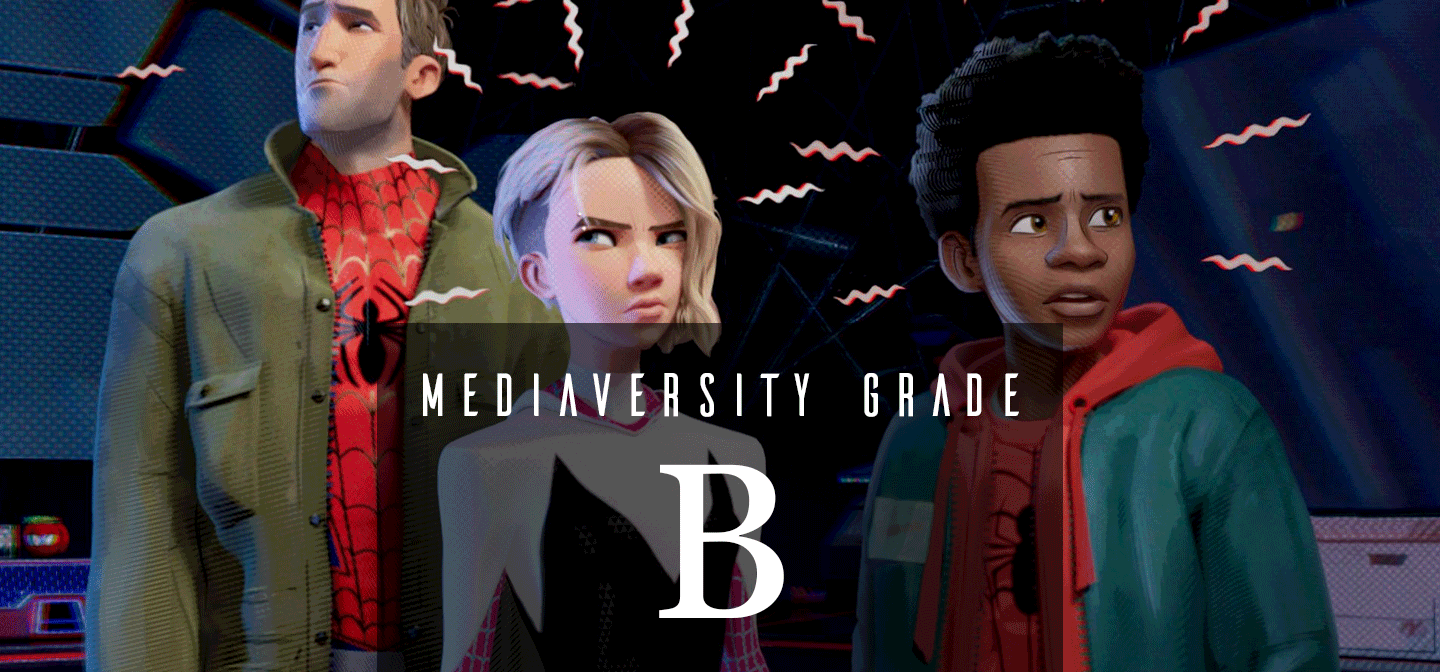Spider-Man: Into the Spider-Verse
“I’m flummoxed by how many new (and progressive!) films still fail the laughably easy Bechdel Test.”
Title: Spider-Man: Into the Spider-Verse (2018)
Directors: Bob Persichetti 👨🏼🇺🇸, Peter Ramsey 👨🏾🇺🇸, and Rodney Rothman 👨🏼🇺🇸
Writers: Story by Phil Lord 👨🏼🇺🇸 and screenplay by Phil Lord 👨🏼🇺🇸 and Rodney Rothman 👨🏼🇺🇸
Reviewed by Li 👩🏻🇺🇸
Technical: 4/5
Spider-Man: Into the Spider-Verse gets major props for breaking the mold. Whether it's the fresh, candy-colored animation grounded with oil-black edges, or the cracking open of the conventional narrative that Peter Parker is the only Spider-Man, I'm gratified to see so many experimental factors at play.
On entertainment value, the action whips by with web-slinging exhilaration—a requisite for any Spider-Man movie, really. More importantly, Miles Morales (Shameik Moore) and his relationships with his father, uncle, mentor Peter Parker, and new friend Gwen (Brian Tyree Henry, Mahershala Ali, Jake Johnson, and Hailee Steinfeld, respectively) succeed at burrowing beneath the skin, transforming a gorgeous film into one that resonates.
However, as someone who only considers herself an incidental fan of the Marvel Cinematic Universe, Into the Spider-Verse relishes its own canon just a bit too much. In having to keep track of multiple Spidey characters, and contending with the ever-present feeling that I was missing out on decades worth of backstory and in-movie Easter eggs, I couldn't help but experience a lingering sense of detachment. This film wasn’t made for me, and that’s fine. But perhaps another take would have found more footholds for its casual viewers.
Gender: 3/5
Does it pass the Bechdel Test? NOPE
For each new movie that's supposed to be progressive and push boundaries, I’m consistently flummoxed by how many of them still fail the laughably easy Bechdel Test. Literally, it’s so easy to pass the test that it was originally conceived as a joke.
Into the Spider-Verse disappoints in that regard, and despite multiple female characters playing significant roles, not once do they exchange words with each other. That said, the women who do exist pleasantly avoid stereotypes.
Aunt May (Lily Tomlin) provides some welcome maturity to the group of young superheroes, alongside the older Peter Parker from an alternate universe. Gwen Stacy, or Spider-Woman in her own universe, could have easily fallen into the love interest trap but thankfully stands on her own as a friendly new ally. Meanwhile, villain Doc Ock (Kathryn Hahn) pleasantly swaps the gender of her original comic book character, Doctor Octopus, who was a man. This works particularly well, thanks to how empowering it still feels to see women working in STEM, even when they’re baddies.
Race: 5/5
One of Into the Spider-Verse’s standout features is Miles himself, the first Afro-Latino superhero to headline a Marvel picture. As with most triumphs in onscreen representation, Miles means so much more than what we see at face value. It’s affirming to have a hero who is both Puerto Rican and Black, an example of the multiple identities that exist in each of us.
As Richard Newby details in his piece for The Hollywood Reporter, Miles has been expertly contextualized. Rather than being a one-dimensional character of color who codes as white, his culture thrives around him through hip-hop, street art, as well as during scenes of him being an East Coast prep school kid. Newby goes on to explain why having this vibrant and relatable version of Miles is so important.
For all the kids of color who dream of being superheroes ... Into the Spider-Verse leaves us with a clear message: We could always be Spider-Man with the mask on, but now, and perhaps more importantly, we can be Spider-Man with the mask off as well.
While Miles forges much of the path in racial diversity, his family is just as important since they help build out his cultural identity. His father Jefferson Davis plays a loving and nurturing protector, as does Miles’ Uncle Aaron who comes off as more macho but shows his love for Miles in his own way.
In smaller roles, Peni Parker makes a cameo as the anime-styled pilot of a Spider mecha. Her ethnicity is never touched on, but she’s voiced by Kimiko Glenn, who is biracial white and Japanese.
Mediaversity Grade: B 4.00/5
For fans of Spider-Man, Into the Spider-Verse is a must see. For the rest of us, the memorable visuals and action sequences are entertaining enough to get you through the film, but you might be left with the sneaking suspicion that much of this movie—and its allusions to decades of canonical backstory—simply went over your head.




